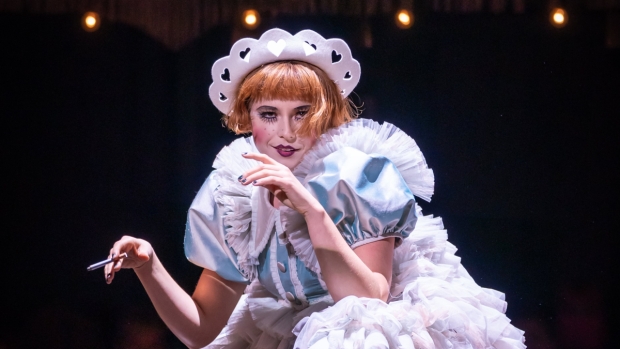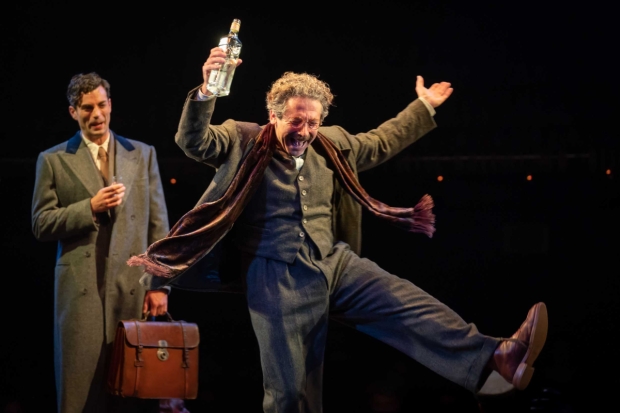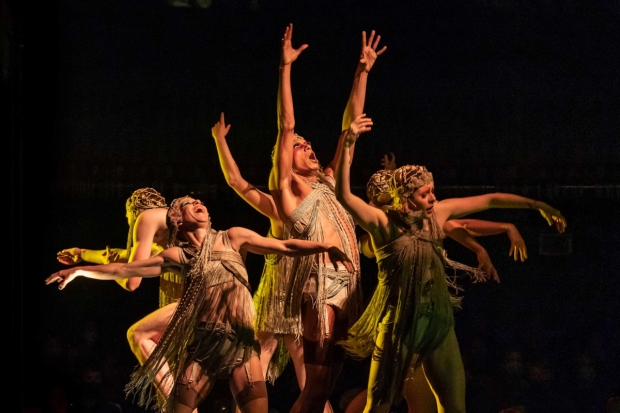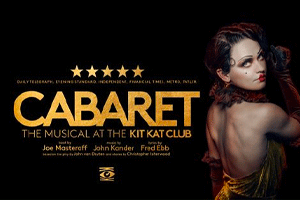Did critics have a perfectly marvellous time at Cabaret?

© Marc Brenner
Sarah Crompton, WhatsOnStage
★★★★★
"The result, central to director Rebecca Frecknall's thinking, is terrifying, with a darkness that reaches all the deeper because the audience has been made to feel complicit. That realism shapes the acting too. Redmayne's Emcee – a proper performance rather than a star turn, though it is thanks to his determination that this entire production happened – is not at all ingratiating. His movement is twisted, his singing strong but staccato and very precise."
"As Sally, Buckley is equally brave. This staggering performance is about as far as you can get from Liza Minnelli in the film, while still both singing the same songs. There's something already disappointed about Buckley's Sally when we first meet her; her voice breaks as she wishes Omari Douglas's dazzled Cliff "Happy New Year". She shows her showbiz brilliance in "Mein Heir", but once she is sacked from the Kit Kat, she conveys Sally's journey from brittle belief to disenchanted clinging-on through her interpretation of the songs."

© Marc Brenner
Alexandra Pollard, The Independent
★★★★★
Surely the most powerful moment – and perhaps the best musical-theatre performance I have ever seen live – is Buckley's rendition of the title song. While in many productions (the 1972 film with Liza Minnelli included) it is performed with peppy razzmatazz, here Buckley is a woman on the edge of a breakdown. "Life is a cabaret old chum," she bellows, at first dripping with sarcasm and then spitting with fury. It is astonishing.
"Back in the 60s, the musical's original director Hal Prince called Cabaret "a parable of contemporary morality". In such capable hands, it's a parable that still packs a punch."
Dominic Cavendish, The Telegraph
★★★★★
"The intensified nature of Frecknall's approach cleverly marries the work's disparate worlds and, by degrees, the good times turn bad, the big-top sounds acquire a more militarised hue, and tenderness marches off. Liza Sadovy's pragmatic landlady recoils from her Jewish suitor (kindly Elliot Levey). Bowles drifts from the increasingly disenchanted American writer Cliff – a charismatic and hypnotically alert Omari Douglas.
"Her journey towards the horns of a hellish dilemma – stay or go, but if the latter, where on earth to? – is delineated to perfection. The chameleonic Buckley makes her first big entrance in her flapper-age opening song "Don't Tell Mama", springing through a central stage aperture like a petticoated doll let dementedly loose."
Nick Curtis, Evening Standard
★★★★★
"Buckley sings her heart out as a fretful, doomed Sally Bowles: a powerhouse of emotion, she leaves everything on stage. Eddie Redmayne's Emcee is a brilliantly twisted creation, part tribute to Joel Grey's original performance on Broadway and in Bob Fosse's 1972 film adaptation, part George Grosz grotesque, part baby crocodile. The louche, gender-fluid ensemble, writhing in variations of lingerie and lederhosen to Julia Cheng's sinewy choreography, and the female-led orchestra are impeccable. Again, just wow.
"Cabaret is a show about reinvention and the result of reinvention: a Christopher Isherwood story that became a play then a musical. Fosse's film, with an altered storyline and songlist and iconic performances from Grey and Liza Minelli as Bowles, casts a long shadow, but it's vanquished here."

© Marc Brenner
Tim Bano, The Stage
★★★★★
Frecknall's ascendancy as a director has been that complicated combination of deserved but precipitous. Her breakthrough hit, Summer and Smoke at the Almeida in 2018, was only her second professional production. Redmayne happened to see it, and requested her as director for this production. Every decision she makes here has clear, clever purpose. This Cabaret isn't a radical reinterpretation, but its differences from previous productions plant themselves subtly at first, then ripple outward until they overwhelm.
On the ornate wooden revolve we have a criss-crossing of two modes: the story of American writer Clifford Bradshaw arriving in Berlin and ending up in lodgings with second-rate cabaret singer Sally Bowles, and scenes in the Kit Kat Club where the Emcee introduces musical numbers, this unreal space representing the soul of Berlin.
Arifa Akbar, The Guardian
★★★★
"There are several moments at which we catch our breath, one coming in "If You Could See Her" in which he pushes the comic absurdism of singing a soppy love song to a gorilla and then chills us with the last, antisemitic line, spat out like snake venom rather than whispered like Joel Grey's comic aside in the 1972 film."
"Rebecca Frecknall's production on the whole lives up to its hype, magnetising us with flamboyant camp and then delivering menace that feels freshly charged."
Clive Davis, The Times
★★★★
"If the cast have limited room for manoeuvre, the setting still looks fabulous. What's more, once you enter the Playhouse, burrowing through a lower-level maze of corridors, pre-show performers evoke a real-life version of the Kit Kat Club.
"Musicians and decadent young things mingle with punters in bars and small rooms. True, it sometimes feels like you have fallen among a gang of Oxford undergrads doing their best to be naughty, but the designer, Tom Scutt, and his team have fashioned lots of seductive decorative details."











